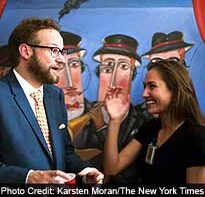Jonathan Levy was standing on the coffee table in his spacious apartment, holding up a bottle of Lagavulin 16 like a trophy. It was after midnight on a Wednesday last month and the living room was packed with chief executives, designers, philanthropists and TV personalities.
Advertisement
Advertisement
Advertisement
Advertisement
For the latest food news, health tips and recipes, like us on Facebook or follow us on Twitter and YouTube.
Advertisement
